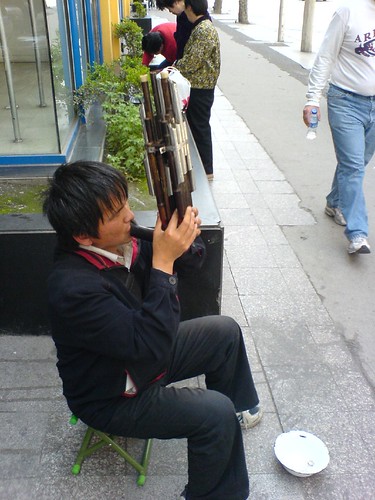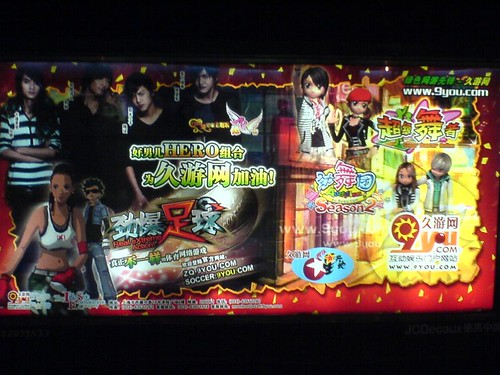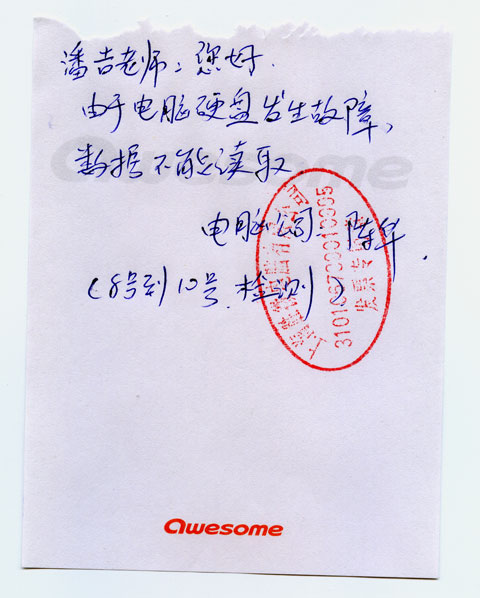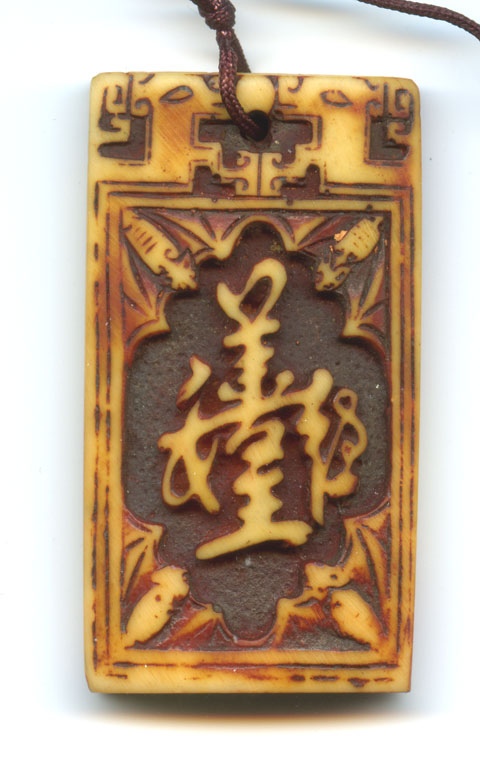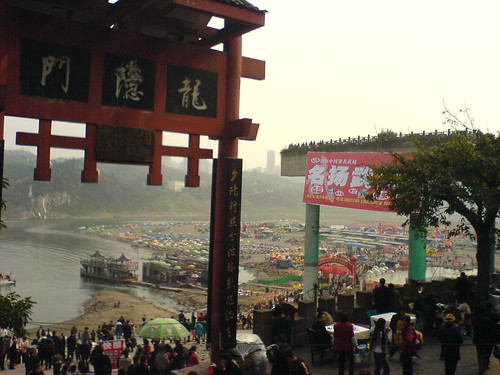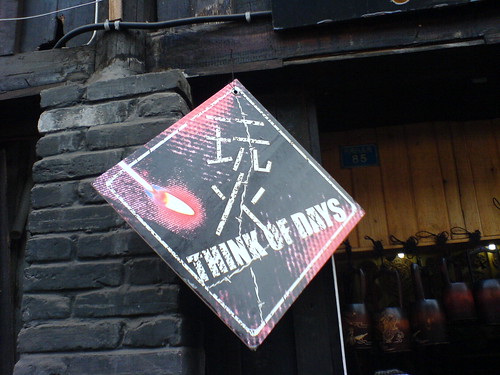01
Apr 2007Ethics and Instruments: a Photograph
This is a blind musician playing outside of Nanjing Road West (南京西路) Station in Shanghai. Two questions:
1. Is it OK to photograph a blind person without their knowing it? (I photographed this guy without asking, and then gave him 5 RMB.) The ethics of photography has always been an interesting subject to me, and it’s one I’ve actually really quite struggled with over the years, especially in the northern mountains of Thailand and in China’s Yunnan.
2. What is that funky instrument?? It’s really quite cool… way better than the boring old erhu. I do believe it was… polyphonic.
31
Mar 2007Democracy Invented in China
Long Legged Fly is at it again with his Onion-style articles. (This has been done before, most notably by the not-updated-since-2006 Gou-rou.com, but I especially like the ones that Long Legged Fly chooses to write.) This time it’s CHINA DISCOVERS DEMOCRACY ACTUALLY INVENTED IN CHINA.
An excerpt:
> As with their invention of the modern game of soccer, the probability that two different civilizations could separately invent such dauntingly complex things as voting or kicking a ball around is so small as to be almost impossible. “The only likely conclusion,” says Professor Wang, “is that these things, like pretty much everything in the world, were invented in China, and spread to the West through trade routes or magic.”
See also the BEST AT CHINA AWARD.
29
Mar 2007Satisfying Conclusions
Remember how my visa went 144 days overdue, then when I got it renewed, I only got a 2 month visa? Well, I got my new passport, then I finally got my new visa. Today. Looks like I’ll never need to apply for a student visa again. For me, that is a satisfying conclusion.
Speaking of satisfying conclusions, I’ll soon be able to put closure soon on another story I once told here on this blog. Can anyone guess which one it is? (No, it has nothing to do with me getting married.)
Of course, the real satisfying conclusion will be when ChinesePod finally launches V3. It has been extremely busy these past two weeks, and it’s not quite over yet…
I’ll be blogging more when it is.
26
Mar 2007Semantic Flavors of "My" in Chinese and English
My end of the term pragmatics/semantics paper looked at the use of the English word “my” in certain constructions and compared it with the corresponding “我的” constructions in Chinese.
When you say “my X” in English, it could actually mean a variety of things, but we generally expect it to mean something like “the X that belongs to me.” Such is the case for “my book,” “my blog,” my hand,” etc. When X is a societal unit or group, however, the semantic relationship is no longer the default. Let’s take a look at these examples:
– my parents
– my family
– my class
– my gym
– my university
– my bank
– my company
– my hometown
– my city
– my government
– my country
So when you say “my parents,” are you expressing that your parents belong to you, or that you belong to your parents? Or is it another relationship altogether?
25
Mar 2007My Own Crayon
I’m a bit late in calling attention to this, but it looks like I got my name on a Chinese crayon. Well, a Sinocidal crayon, anyway.
What they call “John Pasden Gator Green” is affectionately (?) referred to by my friends as “Sinosplice Green,” or, to the slightly nerdier, #336633.
I’ve been pondering a redesign lately. I won’t have time to do it until late summer, but I’m thinking… Less green. More white. More space. Wider than 800 pixels.
23
Mar 2007Little i, the Chinese Chatbot Bigot
Roddy of Chinese-Forums.com brought to my attention 小i, a Chinese chatbot. Roddy had some amusing exchanges, but 小i has a less cute side as well.
When the subject of Japan or the Japanese come up, 小i responds:
> 不怎么样,非常恶心的 (it’s not too great, really disgusting)
> 坚决打倒~~ (resolutely overthrow)
> 没去过,但是他们说日本人挺恶心的! (I’ve never been, but they say the Japanese are quite disgusting!)
When the subject of the Taiwanese comes up, 小i responds:
> 我不喜欢台湾人,太小气了 (I don’t like the Taiwanese, they’re too stingy)
When the subject of black people comes up, 小i responds:
> 巧克力 (chocolate)
When I say I’m pregnant, 小i responds:
> 谁知道是谁的,快去打了 (Who knows whose it is — go abort it)
When I say I want to commit suicide, 小i responds:
> 好好好!~~你快点!我等着!~~我会给你打点好一切后事的!~~~ (Good good good! Hurry up! I’m waiting! I’ll take care of all the funeral arrangements for you!)
I guess this dialogue I had with 小i sums it all up:
> Me: 你不是人 (You’re not a person)
> 小i: 我是机器人。 (I’m a robot.)
> Me: 机器人很坏 (Robots are bad.)
> 小i: 对啊 (That’s right.)
Despite its bad upbringing, 小i is quite fun to play with. Roddy says individual netizens can help train its responses, which explains a lot. You can add it to your MSN buddy list.
22
Mar 2007Bad Subway Ad
There’s not much to do while waiting for the subway other than look at the ads (and also wonder if a crazy person might ever push someone else onto the track in front of an oncoming train). Here’s the worst one I’ve ever seen:
Just looking at it makes my intellect hurt. Never mind that I’m not the target audience… this is simply horrific.
20
Mar 2007Expat in the Corner
In lieu of a real post, I will link to a ChinaDaily article about some foreigner in China that probably thinks he’s hot stuff.
We bitter expats in China hate guys like this.
(Hmmm, could lack of posting correspond to my recent acquisition of God of War 2? Nah… I’m busy, I tell you!)
17
Mar 2007Buying God of War 2 in Shanghai
I recently went to my local video game store and asked when God of War 2 was coming out (yeah, I’m a little excited about this game). They told me March 15th. Well, this past week at ChinesePod was really busy, working hard to implement all kinds of new features.
Yesterday (March 16th) after work, I met my wife for dinner. She asked about God of War 2. I had forgotten about it. We rushed over to a nearby video game store, and the conversation went something like this (keep in mind that the normal price in Shanghai is 5 RMB per PS2 game):
> Me: Do you have God of War 2?
> Shop Owner: (not looking up from his game) Yes.
> Me: How much?
> Shop Owner: (not looking up from his game) 20.
> Me: 20?! Why??
> Shop Owner: (not looking up from his game) It’s DVD-9 and it’s brand new.
> Me: So how long is it going to be 20?
> Shop Owner: (not looking up from his game) Come back tomorrow and it’ll be 10. No, wait, 15.
> Me: Forget it.
Then my wife and I headed to our local video game store. We were afraid it would be closed, but it wasn’t. They had God of War 2, but the boss told me it wasn’t working on a lot of people’s PS2 machines. When I tried to pay, he insisted on giving it to me for free, because I had recently helped him out with something.
When I got home it took about 5 tries, but it worked.
Today John B informed me that that same shop is charging 15 RMB for the game.
Oh, and by the way… yes, it is awesome.
P.S. Piracy is bad!
16
Mar 2007A Conversation with a Wrong Number
I had the following conversation with a woman this morning after she called my cell phone for the second time:
> Woman: Hi, are you Pan Meihua?
> Me: No. You’ve got the wrong number again.
> Woman: Are you sure? What’s your name?
> Me: Yes. My name is Pan Ji, not Pan Meihua.
> Woman: But do you know Zhang Jie?
> Me: What?
> Woman: Zhang Jie! Do you know her?
> Me: Well, I know a “Zhang Jie,” but it’s a pretty common name…
> Woman: The Zhang Jie that sells insurance!
> Me: Oh, yes, I do know a Zhang Jie that sells insurance…
> Woman: Well, I’m her cousin! I’m in Shenyang!
> Me: OK…
> Woman: I’m moving to Shanghai soon!
> Me: Look, I know Zhang Jie, but that’s only because she’s my insurance agent!
> Woman: Oh. I guess I still have the wrong number then.
> Me: Yes.
> Woman: OK, bye then.
> Me: Goodbye.
I felt almost bad, because this Dongbei woman was so excited about moving to Shanghai, and she totally wanted to talk to me about it, but she obviously had the wrong number. I guess maybe my insurance agent gave her my number by mistake.
14
Mar 2007Busy ChinesePod
I’ve been doing work for “Version 3” of ChinesePod for quite a while now, but it was sort of not public so I couldn’t really say anything. Now the fabulous news is coming to light. Ken and Hank are blogging about it. The latest is: Brand new look. So if I’ve told you “I’m really busy at work” recently, this is why. (Also because new hire Adsotrans Dave is wreaking havoc in the office and stealing my pens.)
In other fascinating CPod news, blogger Frank Fradella interviewed me on his blog. Reading it is free!
13
Mar 2007Homework Excuse Note
So last week my hard drive stopped working right before the deadline for my semantics/pragmatics paper. I was able to get an extension, but “I had computer troubles” is the “dog ate my homework” excuse of the modern age, so, conscientious student that I am, I felt the need to get documented “proof” of my computer troubles. I had the computer shop that fixed my hard drive write up a note and put the company seal on it.
Yeah, the whole idea sounds kind of silly, but not nearly as silly as it ended up looking. The computer guy used a tiny scrap of paper to scrawl the note. It just looks ridiculous (and yet, somehow… awesome?):
Anyway, I thought I’d share it because I kind of enjoy the challenge of reading handwritten Chinese. This note isn’t too difficult to read, although a little challenging in parts. If you want help deciphering, though, click through to the Flickr page.
Translation of the note:
> Pan Ji‘s teacher: Hello.
> Due to a computer hard drive failure,
> data could not be read.
> computer company, Chen Hua
> (examined from the 8th to the 10th )
11
Mar 2007Oriental Virgin
Yesterday I saw this logo plastered on the wall of a construction site. It’s the logo for a new office tower in Shanghai.
Apparently the recipe for their English name and logo went something like this:
1. Take a successful foreign company’s name and add “Oriental” to the front. Base the Chinese name on the English name.
2. Copy the logo of a different company, altering it a bit.
I’m guessing that getting a sexually charged name like “Oriental Virgin” was pure “luck”…
09
Mar 2007Forced Break
Wednesday my hard drive died. When I tried to boot my computer, I got this message:
> OS not installed
Yikes! Luckily I had my Ultimate Boot CD, but even that is of little use when your system has decided that your main hard drive (the one with Windows installed on it) is no longer there.
That hard drive was only three months old, so the company I bought from will replace it free of charge, but they can’t do the data recovery. Furthermore, if I want them to replace the hard drive right away and give me the bad hard drive back so I can find someone to recover the data, I need to pay for a new hard drive because they need the bad one to return it to the manufacturer. They’ll refund my money when I return the bad hard drive.
I think I’m just going to pay for the bad hard drive, then when I return it, exchange it for a new one. I’ll then have three 160 GB hard drives. That will be nice (especially if they stop breaking).
Anyway, I am on a short break. Once I get my computer back tomorrow I need to rewrite my 3000 character semantics/pragmatics paper that was due today.
UPDATE: It turned out the problem was that an IDE setting in the CMOS spontaneous changed. I still can’t figure out how that would happen, but anyway, it was an easy fix and no data was lost! The guy showed me which setting to change if it happens again. No charge. I didn’t end up buying another HD after all, and I got a signed, stamped note proving my computer was broken to give to my school. Heh.
06
Mar 2007My Antidiuretic Presence
It was early evening, shortly after dinner. I was on the outskirts of Shanghai trying to find a cab to get home. As I walked the streets I was vaguely aware of a guy standing facing a wall, having a conversation with another nearby guy in a car. I’ve learned that (especially in China) it’s best not to pay attention to guys facing walls on the side of the street, so I never gave him more than a glance. As I passed by, though, I couldn’t help but overhear a part of the two men’s conversation.
> Guy in car: [something annoyed and impatient-sounding]
> Guy at wall: Hold on! I just saw a foreigner so I can’t pee!
I couldn’t help but laugh. Up until that point I hadn’t realized that one of my laowai superpowers was my antidiuretic presence.
04
Mar 2007Four Character Puzzle
In Chongqing my wife’s cousin gave her a Buddhist pendant as a gift. On one side was a form which consisted of four Chinese characters blended together. Can you see them?
The four characters together actually form a (Buddhist?) saying. For the answer, see below. (more…)
02
Mar 2007China and Eugenics
China finally came up on my one of my favorite blogs, Sentient Developments:
> When stripped of all its historical and social baggage, however, ‘eugenics‘ can be used to describe two general philosophical tendencies: 1) the notion that human hereditary stock can and should be improved, and 2) that such changes should be enforced by the state (or other influential social groups such as cults or religions).
> These two concepts are not married to one another. Transhumanists tend to subscribe to the first point but not the second, leading to the charge that they are liberal eugenicists. China, on the other hand, engages in a form of eugenics that draws from both agendas; the state is actively involved in the ongoing biological re-engineering of its citizens for ideological ends.
As usual, the article was a good read. In case you’re unclear of what the author meant by China’s engagement in eugenics, here’s a summary:
> [In 1995], China adopted a new law on maternal and infant health care. The law mandates that all persons have a premarital medical examination to detect serious genetic diseases, some infectious diseases, and “relevant” mental disorders. If a detected disorder is deemed serious, the couple is not permitted to marry without committing to contraception or tubal ligation. Prenatal testing is enforced, and pregnancy is terminated if the fetus has a serious genetic or somatic abnormality. [China’s Eugenics Law on Maternal and Infant Health Care]
The thing is, since 2003 the Chinese government no longer requires premarital medical exams. That leads to this kind of situation:
> The abolition of the national system of compulsory premarital medical checkups one year ago has led to a rapid increase in the rate of birth defects in China, and if the government fails to take measures, it could lead to a still more serious pubic health problem within three to five years, medical experts warned. [ChinaDaily]
So where does the Chinese government now stand with regards to eugenics?
Also interesting are some Chinese geneticists’ views on the issues related to eugenics:
> Most believed that partners should know each other’s genetic status before marriage (92%), that carriers of the same defective gene should not mate with each other (91%), and that women should have a prenatal diagnosis if medically indicated (91%). The majority said that in China decisions about family planning were shared by the couple (82%).
You might be surprised that I’m writing about such a “political” topic. Actually, I’m not. I’m writing about a question of ethics, which is also related to a lot of the futurism discussions I’ve been reading a lot about lately.
Also, according to the prominent Chinese view, it would appear that if my Chinese wife and I have children, we’ll be engaging in a form of “personal eugenics,” since around here everyone knows that 混血儿 (“mixed blood children”) are “better looking” and “smarter” than most people. Hmmm.
01
Mar 2007Secret Language Motivations
Love can be a motivation. I’m not talking about learning how to say enough for “one night love,” I’m talking about this:
> I am learning [language] so I can tell you how much I love you and have it mean more than if I told you in English.
I wonder how many years of study it will take…
Post Secret is still cool.
27
Feb 2007Like a Hamster Ball on the Water
While in Chongqing we went to a carnival by the river side. There was one event that got our attention immediately. It looked like people running around inside giant hamster balls on top of water. What fun!
A thought immediately came to my mind, though: how do they get fresh air in those things? It turns out they don’t. They fill the balls with a big blower, then zipper them shut and put a big piece of tape over the zipper to keep it water tight. You’re only allowed in for 5 minutes, after which the carnies reel you in (the ball is tethered to the shore). It cost 10 RMB.
26
Feb 2007Chongqing
My wife and I had a nice time in Chongqing, even though we saw only a sliver of what the city had to offer. We took Matt Scranton‘s excellent advice and checked out 瓷器口. There were so many cool snacks to try that we couldn’t even eat lunch, and a little later we wound up lost in a maze of twisting old alleyways up on the mountain. We also went to 洪崖洞, which was nothing special.
We spent a lot of the afternoon and evening with my wife’s relatives, where I got a good earful of the Chongqing dialect. I was amused that her uncle’s pronunciation of 美国 (the USA) sounded a lot like 玫瑰 (a rose).
There was so much we didn’t do (we didn’t even have hot pot there!), but we didn’t want to pack too much into the little time we had. We had a nice time, and I wouldn’t mind going back for more. Here are a few pictures.
(Click through to the Flickr pages for explanations of the photos.)

